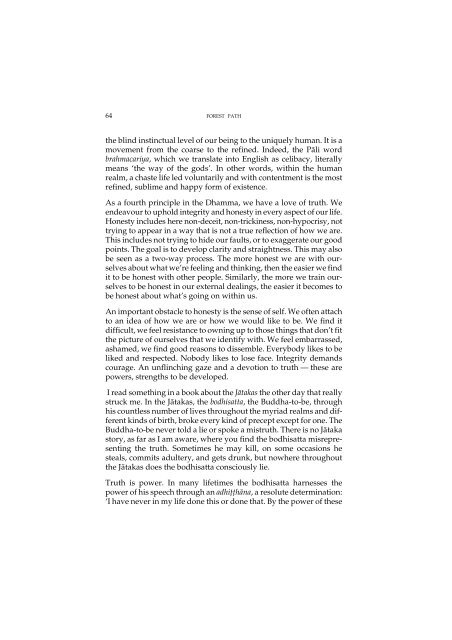Forest Path - Amaravati Buddhist Monastery
Forest Path - Amaravati Buddhist Monastery
Forest Path - Amaravati Buddhist Monastery
Create successful ePaper yourself
Turn your PDF publications into a flip-book with our unique Google optimized e-Paper software.
64 forest path<br />
the blind instinctual level of our being to the uniquely human. It is a<br />
movement from the coarse to the refined. Indeed, the Pàli word<br />
brahmacariya, which we translate into English as celibacy, literally<br />
means ‘the way of the gods’. In other words, within the human<br />
realm, a chaste life led voluntarily and with contentment is the most<br />
refined, sublime and happy form of existence.<br />
As a fourth principle in the Dhamma, we have a love of truth. We<br />
endeavour to uphold integrity and honesty in every aspect of our life.<br />
Honesty includes here non-deceit, non-trickiness, non-hypocrisy, not<br />
trying to appear in a way that is not a true reflection of how we are.<br />
This includes not trying to hide our faults, or to exaggerate our good<br />
points. The goal is to develop clarity and straightness. This may also<br />
be seen as a two-way process. The more honest we are with ourselves<br />
about what we’re feeling and thinking, then the easier we find<br />
it to be honest with other people. Similarly, the more we train ourselves<br />
to be honest in our external dealings, the easier it becomes to<br />
be honest about what’s going on within us.<br />
An important obstacle to honesty is the sense of self. We often attach<br />
to an idea of how we are or how we would like to be. We find it<br />
difficult, we feel resistance to owning up to those things that don’t fit<br />
the picture of ourselves that we identify with. We feel embarrassed,<br />
ashamed, we find good reasons to dissemble. Everybody likes to be<br />
liked and respected. Nobody likes to lose face. Integrity demands<br />
courage. An unflinching gaze and a devotion to truth — these are<br />
powers, strengths to be developed.<br />
I read something in a book about the Jàtakas the other day that really<br />
struck me. In the Jàtakas, the bodhisatta, the Buddha-to-be, through<br />
his countless number of lives throughout the myriad realms and different<br />
kinds of birth, broke every kind of precept except for one. The<br />
Buddha-to-be never told a lie or spoke a mistruth. There is no Jàtaka<br />
story, as far as I am aware, where you find the bodhisatta misrepresenting<br />
the truth. Sometimes he may kill, on some occasions he<br />
steals, commits adultery, and gets drunk, but nowhere throughout<br />
the Jàtakas does the bodhisatta consciously lie.<br />
Truth is power. In many lifetimes the bodhisatta harnesses the<br />
power of his speech through an adhiññhàna, a resolute determination:<br />
‘I have never in my life done this or done that. By the power of these

















